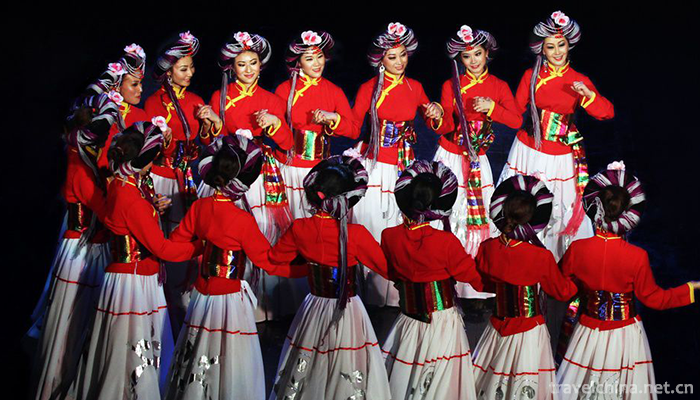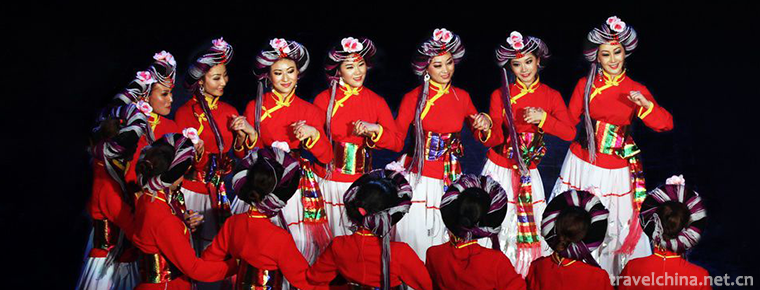Nail twist Jiaru jiacuo
Nail twist Jiaru jiacuo
Jiaru is a traditional dance of Mosuo people in Lugu Lake, Yunnan Province. It is a song and dance for people to celebrate harvest, festivals and pray for gods.
In June 2008, Jiaru declared by Yanyuan County of Sichuan Province was listed in the second batch of national intangible cultural heritage list.
historical origin
The origin of Jiaru is also related to war. It is said that when Mosuo was attacked by foreign nationalities, tribal leaders launched their own nationalities and set a fire on the village gate dam. People surrounded the fire pond, shouted and stamped their feet, created momentum, encouraged prestige and defeated the enemy. After the victory, they sang around the fire pond and danced happily. As a result, Jiaru Dance has become a group entertainment square dance. It has become a song and dance for people to celebrate harvest, festivals and pray for gods. It also provides convenience for young men and women to talk about love and make friends with Asha.
artistic characteristics
Jiaru's dance rhythm is strong, the dance steps are vigorous and rough, happy and warm. The lead dancer is accompanied by bamboo flute or reed. The dancers hold hands tightly, cross five fingers, face the campfire and dance counter-clockwise. Dancing steps change with the speed of music rhythm. Sometimes people say "Arrow, Ruo" in accordance with the rhythm of dance steps. The cry, and sometimes someone led the singing of the armor rubbing song, people will join. When dancing, the girls'snow-white skirts were swirling lightly, silver chains were shining in front of their chests, hair braids made of green silk thread were floating in their ear temples, beads were shining in front of their foreheads, and the graceful Mosuo women added a few charms.
Whether it's the old war dance or the auspicious autumn harvest dance, the New Year dance, the dance melody is lively and warm, the footwork is changeable, the time is tight and the time is slow, regardless of hundreds of people and thousands of people, the dance is neat and unified. When fast, bold and vigorous, slow and leisurely. Every festival, Mosuo people take villages as units or several villages unite around the campfire, jumping around happily, often all night long. The so-called armor rubbing, armor is good, beautiful meaning; rubbing is dance, United means to dance for a better time or era.


-
3.Jingpo Lake
Jingbo Lake: National AAAAA-level tourist attractions, World Geopark, National Key Scenic Spots, International Ecotourism Resort, National Civilized Scenic Spots Demonstration Sites
Time 2018-12-05 -
4.Red Flag Canal Scenic Area
Red Flag Canal Scenic Area is a national AAAAA class scenic area, covering an area of five square kilometers. Red Flag Canal Scenic Area is composed of Red Flag
Time 2019-01-16 -
5.Restoration Techniques of Ancient Ceramics
Ancient ceramic restoration technology is a special artistic creation of comprehensive modeling, sculpture, color, calligraphy, painting, chemical industry, etc. Ancient Ceramics Restoration must be c
Time 2019-05-01 -
6.Nail twist Jiaru jiacuo
Jiaru is a traditional dance of Mosuo people in Lugu Lake, Yunnan Province. It is a song and dance for people to celebrate harvest, festivals and pray for gods.
Time 2019-05-05 -
7.Jiang state drum music
Jiangzhou Drum Music, also known as Jiangzhou Big Drum, refers to the local folk popular Gong and drum music and percussion music in Xinjiang County, Shanxi Province.
Time 2019-05-05 -
8.a kind of Shanxi opera
Shangdang Bangzi is one of the four Bangzi in Shanxi Province. It is popular in the two cities of Shanxi Province, namely, the Minister of southeastern Shanxi Province and Jincheng City (formerly know
Time 2019-06-13 -
9.Ten times of music
Shifan music is a traditional instrumental music spread by Hakkas in Fuzhou and Western Fujian Province. It has been circulated since the middle of Daoguang in the Qing Dynasty. The origin of Shifan m
Time 2019-06-15 -
10.Silver and Copper Ware Making and Gold smelting Techniques
Silver and bronze wares production and gold mincing skills, local traditional skills in Huangzhong County, Qinghai Province, one of the national intangible cultural heritage.
Time 2019-07-13 -
11.Liu Che
Liu Che (July 14th 156 BC - March 29th 87 BC) Martial Emperor , Western Han Dynasty Seventh emperors (including Shao Di before and after). Politician And a litterateur.
Time 2019-09-07 -
12.Meishan local culture
Meishan culture mainly includes Dongpo culture, longevity culture, Taoism culture, Buddhist culture, bamboo culture, water culture and so on. The past Meishan Dongpo Cultural Festival, Pengzu Shouxing Festival, Qingshen bamboo weaving art festival, Danling suona Festival, etc.
Time 2020-12-18